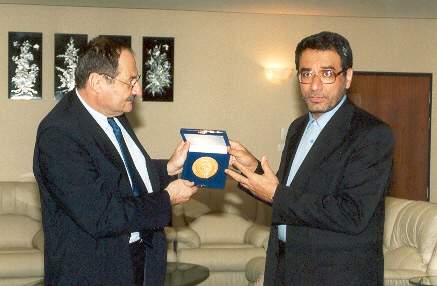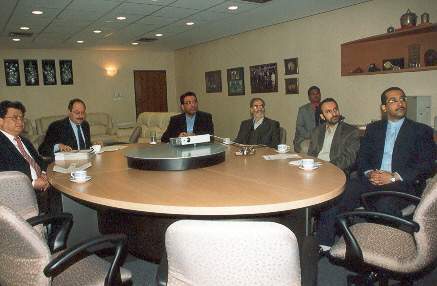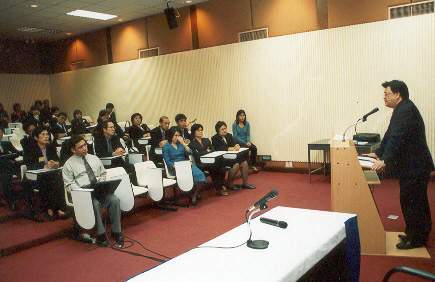
Dr. Reza Farajidana (right), President, Tehran University is seen giving a commemorative logo of Tehran University to Prof. Jean-Louis Armand, AIT President.
Visiting AIT
On March 17, 2004, H. E. Mr. Rasoul Eslami, Ambassador Extraordinary and Plenipotentiary to Thailand and Permanent Representative to ESCAP, and a delegation from the Tehran University (TU) of Iran visited AIT.
The TU delegation was led by Dr. Reza Farajidana, President of Tehran University and comprised of Dr. Mohammad Rahimyan, Deputy for Research, Tehran University and Dr. Seyed Hossein Hosseini, Deputy for Academic Affairs and Graduate Studies, TU. The delegation was accompanied by Mr. Siamak Azodolmolky, The Embassy's IT Education/Press Advisor, and was later joined by H.E. Mr.Rasoul Eslami, Ambassador of Iran.

From left: Dr. Reza Farajidana, President Tehran University; H.E. Mr. Rasoul Eslami, Ambassador Extraordinary and Plenipotentiary to Thailand and Permanent Representative to ESCAP, and Prof. Jean-Louis Armand, AIT President.
During the visit, H. E. Mr. Rasoul Eslami and his delegates met with Prof. Jean-Louis Armand, AIT President; Prof. Mario T. Tabucanon, Provost; Prof. H. N. Phien, Dean SAT and Prof. Worsak Kanok-Nukulchai, Dean SCE.

Seen watching a presentation on AIT, from left, Prof. Mario T. Tabucanon, Provost; Prof. Jean-Louis Armand, AIT President; Dr. Reza Farajidana, President Tehran University; Dr. Mohammad Rahimyan, Deputy for Research, Tehran University; Dr. Seyed Hossein Hosseini, Deputy for Academic Affairs and Graduate Studies, TU; and Mr. Siamak Azodolmolky, the Islamic Republic of Iran Embassy in Bangkok IT and Education/Press Advisor.
They also met and got acquainted with the Iranian students currently studying at AIT. The delegation at a later time visited the laboratories of the Pulp and Paper Technology, Asian Center for Research on Remote Sensing (ACRoRS) as well as the Telecommunications and Structural Engineering Fields of Studies.
The visit aimed to explore and discuss collaborations between AIT and Tehran University of Iran. In line with this, the possibility of student and faculty exchange programs were discussed. Also discussed on the agenda were means of unearthing and identifying sources of scholarships for Iranian students to enable them to study at AIT. A further meeting was unanimously agreed so that further discussion be made for potential Memorandums of Understanding between AIT and Tehran University.

On the same day a delegation (above) consisting of 52 university professors/administrators from 37 universities all over Thailand visited AIT.
The visit is a part of the training program for university professors/administrators as a preparation to become university top administrators organized by the
Office of Higher Education Commission, Ministry of Education, Thailand. The training program aims to improve administrative skills of these future university top administrators and build up network among various universities both within and outside Thailand.

The delegation was received at the Milton Bender Auditorium and were briefed on general overview about AIT and AIT's academic quality assurance by Prof.
Mario T. Tabucanon (above right), AIT Provost and Ms. Kanya Worawichawong (below right), Corporate Relations Coordinator.

They also visited SERD and SCE to learn more about the administration at the School level.
On March 18, 2004 Mr. Dasho Zangley Dukpa, Vice Chancellor, Royal University of Bhutan; Mr. Dasho Tashi Dorji, Councillor, Royal Bhutanese Embassy, Bangkok and Ms. Kesang Doma, Registrar, Royal University of Bhutan visited AIT

From left: Prof. Mario T. Tabucanon, Provost; Prof. Jean-Louis Armand, President; Mr. Dasho Zangley Dukpa, Vice Chancellor, Royal University of Bhutan; Mr. Dasho Tashi Dorji, Councillor, Royal Bhutanese Embassy, Bangkok and Ms. Kesang Doma, Registrar, Royal University of Bhutan
The group met with Prof. Jean-Louis Armand, AIT President; Prof. Mario T. Tabucanon, Provost; Prof. Chongrak Polprasert, Dean SERD; Prof. Huynh Ngoc
Phien, Dean SAT; Dr. Peter. F. Haddawy from SAT and Prof. Stephen O. Ogunlana
from SCE.
The delegation aimed to explore potential collaboration with AIT. The discussion focused on specific collaborative activities in faculty exchange and furthermore, this university confirmed to seek the balance funds to send their faculty to continue their studies at AIT.
AIT welcomes faculty from Royal University of Bhutan and other highly qualified professionals from Bhutan to pursue graduate studies and continuing education at AIT and to carry out projects in the fields of HRD and ICD for Bhutan's sustainable development. President Armand advised to hold Advisory Panel Meeting in Bhutan on June 2005.
In addition, the delegation was very interested in the fields of study related to Natural Resources Management, Agricultural Systems and Engineering, Human Resource Management and Construction, Engineering and Infrastructure Management.
On March 19, 2004 Dr. Nobuaki Matsunaga (below, third from left) and Dr. Tetsuo Hamauzu (below, fourth from left), Japan International Cooperation Agency (JICA) Experts at the Faculty of Economics and Management, National University of Laos (NUOL) PDR and also at Lao-Japan Center visited AIT.

During the visit they met with Mr. Benjamin A. Gargabite (above left), Director of Admissions and Scholarships; Dr. Nazrul Islam (above, second from left), Acting Dean, SOM; Prof. Mario T. Tabucanon (above, second from right), Provost; and Ms. Kanya Worawichawong (above, right), Corporate Relations Coordinator.
The purpose of the visit was to discuss in details the plan to start the collaboration between the Lao-Japan Center and AIT which will be commenced by sending two young lecturers from the NUOL to attend the MBA program at AIT.
The Lao-Japan Center is assisting the Faculty of Economics and Management of NUOL to establish a graduate program envisaged in 2006. As a preparation, JICA is sponsoring many young lecturers from NUOL to be trained at an advanced level. AIT was also requested to assist in the planned
establishment of this graduate program at the NUOL by ways of helping develop the curriculum, supervising student thesis, sending faculty for teaching courses etc.
